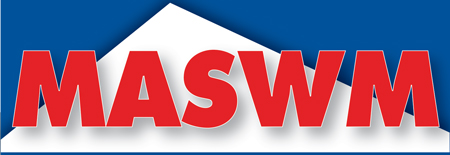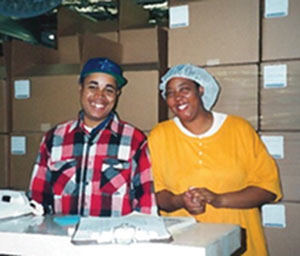
Members | About Workshops | Services for Missourians | News
Dignified and meaningful employment
for people with disabilities

Workers enjoying time at Project Inc. in one of the early scenes from one of the first shops to open in the state.
Grassroots Quest Fills Gap, Brings Huge Bargain for Missouri
The story of Missouri’s Extended Employment Sheltered Workshops began in the 1950s and hit full stride in the 1960s. Seeking options for their children with disabilities, often desperately, parents and guardians began forming workshops to provide employment opportunities for them.
For most of these parents and their children, the only alternatives were sitting at home or in programs that required massive government subsidies. With real vision, these parents realized that gainful employment would bring other advantages as well, including pride and skills. Although much has changed, that foundation remains true for workshops today.
Missouri workshops remain different from shops in many other states. They depend heavily on contracted work and the revenue from that work to maintain operations. In reality, workshops are small businesses that hire individuals with disabilities. On average, a workshop’s contract revenue accounts for 70-80 percent of workshop revenue, government assistance 10-24 percent and the rest from additional grants.
The majority of workshop employees have been diagnosed with developmental disabilities. Other frequent disabilities include mental illness, head injury, blindness, deafness, seizure disorders and physical disabilities.
The Division of Vocational Rehabilitation first assesses these Missourians in order to determine whether or not they are capable of working in a competitive environment. If the rehabilitation counselor determines they cannot work competitively, the counselor will certify them for employment in the workshop.
Although workshops compete in an open market, the needs of their employees mean extra supervision and other elements that increase workshop overhead. A major step was taken in 1971 with passage of Missouri Senate Bill 40. SB40 provided important funding support by enabling local counties to create tax levees for workshops and residential facilities. Additional funding today includes a per diem supplement for each workshop employee from the Department of Elementary and Secondary Education Sheltered Workshop Division.
County and state funding does fill a critical gap from higher overhead for workshop supervision and other services to people with disabilities. Workshops also rely on quality, flexibility and their large workforce to sell their services, making that supervision critical.
Besides the obvious goal of providing employment for people with disabilities, workshops also put money back into their communities. Payroll, purchase of goods and services and participation in local affairs are some of the ways that workshops contribute to the community. This community “payback” totals hundreds of millions of dollars each year—one more bargain that workshops bring.
Latest Info | Workshop Directory | What We Offer | MASWM Home
MASWM The Missouri Association of Sheltered Workshop Managers
If you have questions, please contact:
President Tim Poepsel – (573) 503-0000 or tpoepsel@empacgroupinc.com
or Legislative Chair Kit Brewer – (314) 647-3300 or cbrewer@cuinc.org